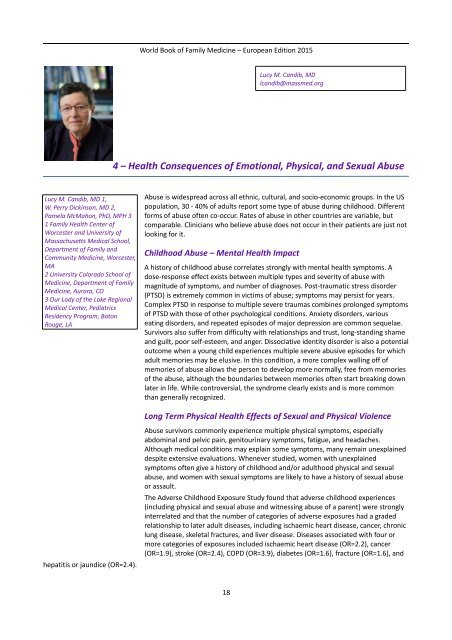Family Medicine
U8VnW
U8VnW
Create successful ePaper yourself
Turn your PDF publications into a flip-book with our unique Google optimized e-Paper software.
World Book of <strong>Family</strong> <strong>Medicine</strong> – European Edition 2015<br />
Lucy M. Candib, MD<br />
lcandib@massmed.org<br />
4 – Health Consequences of Emotional, Physical, and Sexual Abuse<br />
Lucy M. Candib, MD 1,<br />
W. Perry Dickinson, MD 2,<br />
Pamela McMahon, PhD, MPH 3<br />
1 <strong>Family</strong> Health Center of<br />
Worcester and University of<br />
Massachusetts Medical School,<br />
Department of <strong>Family</strong> and<br />
Community <strong>Medicine</strong>, Worcester,<br />
MA<br />
2 University Colorado School of<br />
<strong>Medicine</strong>, Department of <strong>Family</strong><br />
<strong>Medicine</strong>, Aurora, CO<br />
3 Our Lady of the Lake Regional<br />
Medical Center, Pediatrics<br />
Residency Program, Baton<br />
Rouge, LA<br />
Abuse is widespread across all ethnic, cultural, and socio-economic groups. In the US<br />
population, 30 - 40% of adults report some type of abuse during childhood. Different<br />
forms of abuse often co-occur. Rates of abuse in other countries are variable, but<br />
comparable. Clinicians who believe abuse does not occur in their patients are just not<br />
looking for it.<br />
Childhood Abuse – Mental Health Impact<br />
A history of childhood abuse correlates strongly with mental health symptoms. A<br />
dose-response effect exists between multiple types and severity of abuse with<br />
magnitude of symptoms, and number of diagnoses. Post-traumatic stress disorder<br />
(PTSD) is extremely common in victims of abuse; symptoms may persist for years.<br />
Complex PTSD in response to multiple severe traumas combines prolonged symptoms<br />
of PTSD with those of other psychological conditions. Anxiety disorders, various<br />
eating disorders, and repeated episodes of major depression are common sequelae.<br />
Survivors also suffer from difficulty with relationships and trust, long-standing shame<br />
and guilt, poor self-esteem, and anger. Dissociative identity disorder is also a potential<br />
outcome when a young child experiences multiple severe abusive episodes for which<br />
adult memories may be elusive. In this condition, a more complex walling off of<br />
memories of abuse allows the person to develop more normally, free from memories<br />
of the abuse, although the boundaries between memories often start breaking down<br />
later in life. While controversial, the syndrome clearly exists and is more common<br />
than generally recognized.<br />
Long Term Physical Health Effects of Sexual and Physical Violence<br />
hepatitis or jaundice (OR=2.4).<br />
Abuse survivors commonly experience multiple physical symptoms, especially<br />
abdominal and pelvic pain, genitourinary symptoms, fatigue, and headaches.<br />
Although medical conditions may explain some symptoms, many remain unexplained<br />
despite extensive evaluations. Whenever studied, women with unexplained<br />
symptoms often give a history of childhood and/or adulthood physical and sexual<br />
abuse, and women with sexual symptoms are likely to have a history of sexual abuse<br />
or assault.<br />
The Adverse Childhood Exposure Study found that adverse childhood experiences<br />
(including physical and sexual abuse and witnessing abuse of a parent) were strongly<br />
interrelated and that the number of categories of adverse exposures had a graded<br />
relationship to later adult diseases, including ischaemic heart disease, cancer, chronic<br />
lung disease, skeletal fractures, and liver disease. Diseases associated with four or<br />
more categories of exposures included ischaemic heart disease (OR=2.2), cancer<br />
(OR=1.9), stroke (OR=2.4), COPD (OR=3.9), diabetes (OR=1.6), fracture (OR=1.6), and<br />
18


